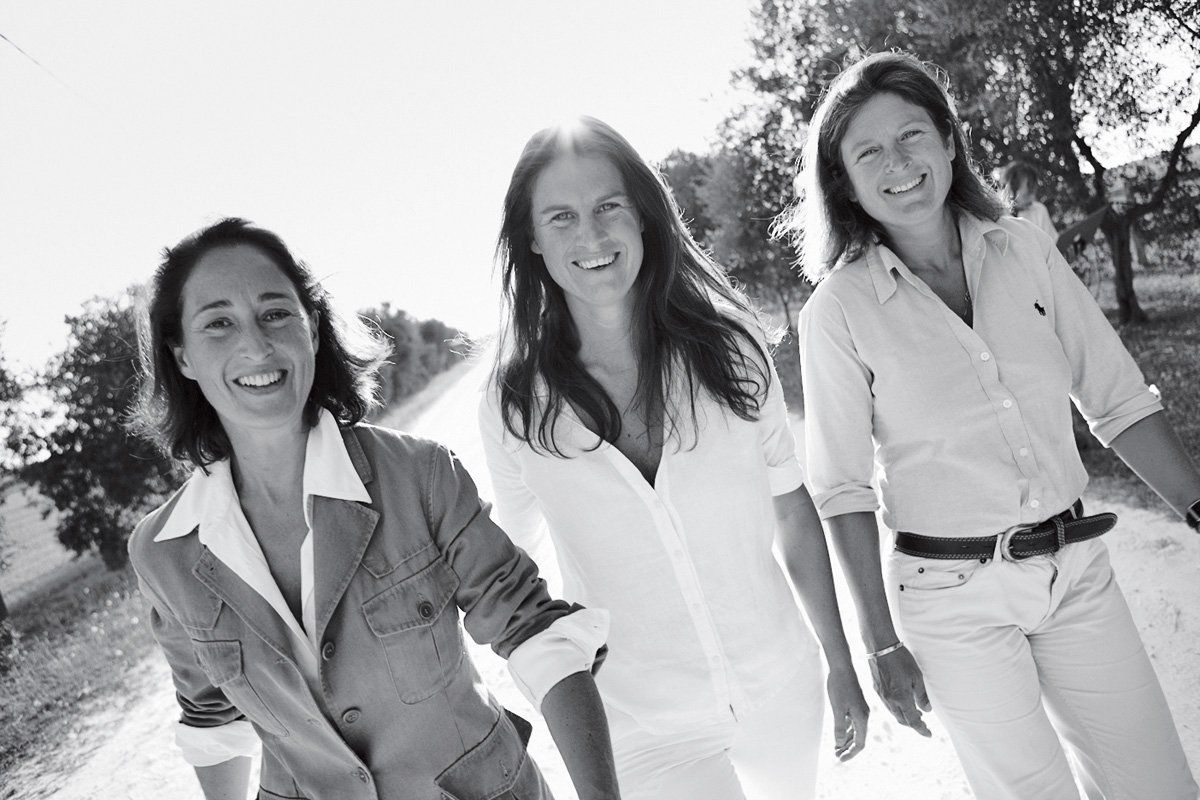
When Italian winemaker Piero Antinori's third child happened to also be his third daughter, he had to rethink a 600-year-old tradition of men running the family business. "He thought to himself, that's life," says 46-year-old Albiera Antinori, now the company's vice president. "He didn't have boys, so he had to deal with what he had."
Albiera, together with sisters Allegra, 42, and Alessia, 37, are the first women in 26 generations of the Antinori lineage to have any significant role in the family's winery. They will eventually head the business when their father retires. They also lead a growing number of women making headway in the male-dominated Italian wine industry, though none for a house as significant and historical as Antinori.
The Antinoris have been in the wine business since 1385, when Giovanni di Piero Antinori first entered the Winemakers Guild of Florence. The door from which the wine merchants of old sold the first bottles from the family cellars is still evident in the façade of the Antinori palace in central Florence. "My hope is that we will be able to maintain what we have been doing, incorporating new ideas along the way," says Allegra, who manages the growing Cantinetta restaurant wing of the business. In October the family opened a restaurant in New York following openings in Moscow, Vienna, and Zürich, Switzerland. "The best thing we can do is take our lifestyle to the people," she says, and explains that the restaurants are like stepping into the heart of Italy without getting on a plane. "We Italians live by the table. This is our way of communicating, by sharing wine."
The wine industry was once a small club, but in the last 10 years, it has become an ultracompetitive global business, say the sisters, who are all involved in public relations in addition to their niche jobs within the Antinori empire. Alessia is considered the family traveler and spent several years developing the Asian and Middle East markets. The family has estates across Italy, in addition to California and Washington state in the United States, Hungary, Romania, Chile, and Malta. They distribute their wines across the world. While their primary customer base is still Europe and North America, the Antinoris have successfully opened markets for their wines in India, Cambodia, Vietnam, Laos, Qatar, and Oman—countries that aren't normally filled with wine drinkers. "Being a woman in certain markets is not easy," says Alessia.
Being a woman definitely brings a different sensibility to the table, especially now, says Allegra, who is considered by her sisters as the most passionate of the three. Women choose the wines more often than men, she says, and they are often more intuitive about food pairings and far more experimental. Having a woman involved in every aspect from winemaking to marketing has made a major difference in the company's growth. "Wine is emotional, not rational," she says. "It has a lot of personality, and people who are not wine experts are starting to understand subtle differences. Women especially embody that."
The global economic crisis has had an impact on business, but the Antinori family believes that a proven history counts when people have less money to spend. "People are still drinking wine," says Albiera, described as the reliable and consistent one. "People don't spend money on esoteric wines, but look for names that they know are reliable. That's where being 26 generations old counts."
But being old doesn't mean being outdated. One might conjure up visions of dusty barrels in musty cellars when thinking of a 627-year-old winery, but the Antinori sisters recently joined their father in inaugurating a state-of-the art cantina in the one of the oldest winemaking regions of Italy. Tucked in the heart of Chianti, it's a sleek underground cellar made from natural Tuscan materials like terra cotta and local stones and hidden under olive groves and rows of grapevines—rendering it nearly invisible from the distance. The family is moving the core of their business from the heart of Florence to the underground cantina, or as Albiera says, "back to the terroir from which the first wines were made."
They plan to invite visitors to the Tuscan countryside to learn about the art of making wine. The cantina has a sleek museum with exhibits of the family's books, awards, winemaking documents, and photographs from the centuries. They will also showcase precious art pieces from the family's extensive collection. There is a boutique and space to host special events and seminars in the lower levels among the massive barrels lined up under a vaulted brick ceiling. "When they see how every one of our wines are made from land, they will understand more about us," Albiera says. "The liquid in the bottle has to embody the soul of the people who make it. Nothing is more important than that."
Uncommon Knowledge
Newsweek is committed to challenging conventional wisdom and finding connections in the search for common ground.
Newsweek is committed to challenging conventional wisdom and finding connections in the search for common ground.
About the writer
To read how Newsweek uses AI as a newsroom tool, Click here.








